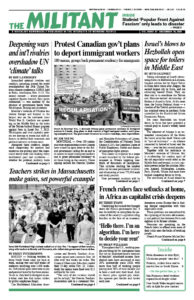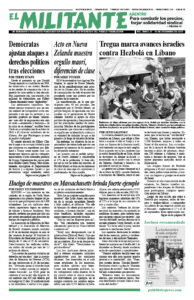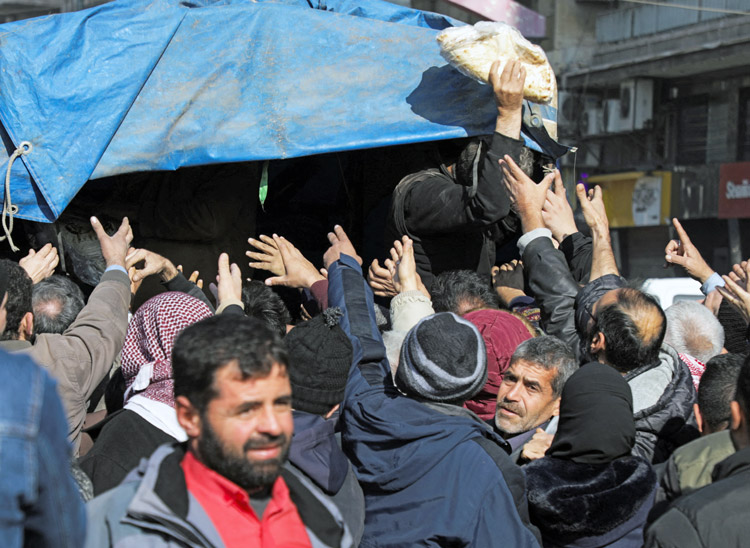Taking advantage of Israel’s devastating blows to Hezbollah in Lebanon, Islamist militias led by Hayat Tahrir al-Sham have taken over Aleppo, the second largest city in Syria, and are advancing toward Hama. They say their aim is to overthrow the Tehran and Moscow-backed dictatorship of Bashar al-Assad in Syria. At the same time, the Syrian National Army — a creation of the Turkish government — has attacked towns in northern Syria controlled by the Kurdish-led Syrian Democratic Forces.
For years Hezbollah has based forces in Syria that have provided a crucial prop to Assad’s widely hated regime.
The takeover of Aleppo is an unintended consequence of the blows the Israeli army has dealt Tehran and its “axis of resistance” — an alliance cemented by hatred of Israel and the Jews — over the last several months.
Together with the resistance to Moscow’s invasion of Ukraine, this is accelerating the coming apart of the old imperialist world order in the Middle East and beyond, as rival capitalist powers jockey for position. Moscow, Ankara, Washington, London, Paris, Riyadh, Tehran and more have backed competing forces in Syria.
The overthrow of Assad would be a major setback for Tehran’s attempt to extend its reactionary influence throughout the region.
The regime in Tehran thought that the Oct. 7, 2023, massacre of 1,200 people in Israel, mostly civilians, the taking of 250 hostages and the rape and mutilation of dozens of women — the largest anti-Jewish pogrom since the Holocaust — would pave the way for Israel’s destruction and the expulsion or murder of the Jews.
But they underestimated the people of Israel, who fought back. Israeli working people in uniform — Jews and Arabs alike — understood that what was at stake was the existence of Israel, home to half the world’s Jews, and the possibilities for Jewish and Arab workers to live together and to defend their common interests.
Since Oct. 7 the Israeli army has decimated Hamas and its leadership in Gaza, eliminated the central leadership of Hezbollah in Lebanon and most of its missiles, and destroyed much of the Iranian regime’s air defenses as well as a key nuclear development site.
No working-class leadership in Syria
In 2011 mass protests by working people of all religions and nationalities calling for an end to Assad’s rule broke out across Syria. The regime met the protests with furious repression. In the absence of a working-class leadership, former Assad military commanders and reactionary Islamist forces took leadership of forces challenging the regime in a 10-year civil war. Islamic State also intervened, trying to carve out areas it could control.
Moscow’s airpower, Tehran’s military aid and assaults by thousands of Hezbollah fighters from Lebanon were key to Assad’s survival.
By 2020 his regime pushed back the rebels. The various Islamist factions retreated to the northwest province of Idlib, protected by the Turkish government. And Islamic State had largely been defeated by Kurdish fighters in alliance with Washington, which still has some 900 troops and bases in the Kurdish region in northern Syria where most of the country’s oil is produced.
Working people in Syria paid a high cost with over 306,000 civilians killed and 12 million “internally displaced,” or fleeing as refugees into Turkey and other countries.
But today, Assad can no longer count in the same way on Moscow, Tehran and Hezbollah to save his regime.
Faced with resistance by the Ukrainian people to Putin’s February 2022 invasion, Moscow began redeploying equipment and personnel to Ukraine, while leaving a presence in Syria. Russian and Syrian planes are now bombing the advancing rebel fighters.
At the same time, Hezbollah withdrew most of its operatives from Syria — including hundreds of combat-tested members of its elite Radwan battalion — back into Lebanon after Israel Defense Forces stepped up attacks on Hezbollah forces to stop their missile strikes on Israel. Tehran-backed militias from Iraq have now begun sending operatives to Syria to try to aid Assad.
Hezbollah severely weakened
A severely weakened Hezbollah — the largest, best-armed member of Tehran’s so-called axis of resistance — agreed to a ceasefire in Lebanon, which began Nov. 27.
Almost immediately, groups in Syria, headed by Hayat Tahrir al-Sham, the Sunni-Islamist militia, moved to take the offensive. This action was given tacit approval by the Recep Tayyip Erdogan regime in Turkey. HTS forces rapidly took over Aleppo, as demoralized Syrian soldiers fled without a fight.
Hayat Tahrir al-Sham originated as an affiliate of al-Qaeda at the start of the Syrian civil war, but says it broke with it in 2016 and paints itself as willing to respect other religious and ethnic groups. After seizing Aleppo, its forces visited Christians in the city pledging to protect them.
The Turkish government-led Syrian National Army has attacked towns in northern Syria controlled by the Kurdish-led Syrian Democratic Forces. Ankara intervenes to advance its own interests, primarily to push back the SDF, which it accuses of promoting the fight for Kurdish national rights in Turkey. Some 30 million Kurds in Iraq, Iran, Syria and Turkey make up the world’s largest nation without their own country.
After Hayat Tahrir al-Sham took over Aleppo, the Syrian National Army attacked Tal Rifaat, a Kurdish town in Syria that had been under control of the Syrian Democratic Forces.
The Kurdish fighters have been negotiating with HTS over the evacuation of Kurds from neighborhoods the SDF controls in Aleppo to the Kurdish region in northeast Syria.
Israel and Syria
The Israeli government has been watching the events in Syria closely. It warned Hezbollah and Tehran not to take advantage of the conflict to rearm Hezbollah.
On Dec. 3, an Israeli airstrike in Damascus killed Salman Nemer Jomaa, Hezbollah’s liaison with the Syrian army.
The stance of HTS toward Israel is contradictory. A few days after Hamas death squads attacked Israel on Oct. 7, Abu Mohammad al-Julani, the leader of Hayat Tahrir al-Sham, said it “brought joy to the hearts of the oppressed.”
But referring to Tehran’s accusation that the rebels are agents of Washington and Israel, an HTS supporter told Israeli TV station KAN, “They accuse us of cooperating with you because we were quite happy when you attacked Hezbollah, really happy, and we’re glad that you won.”


